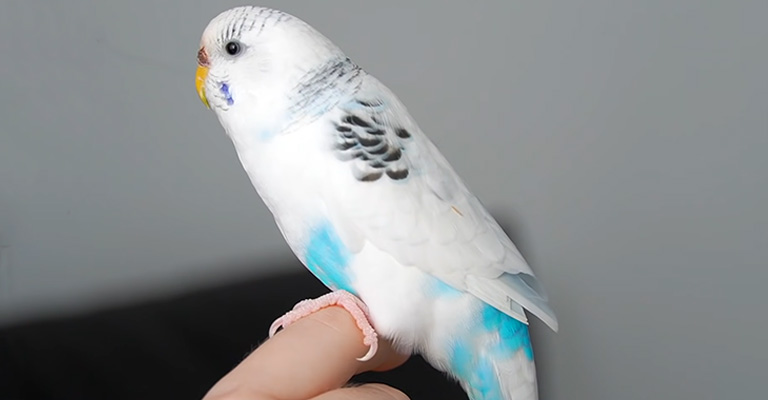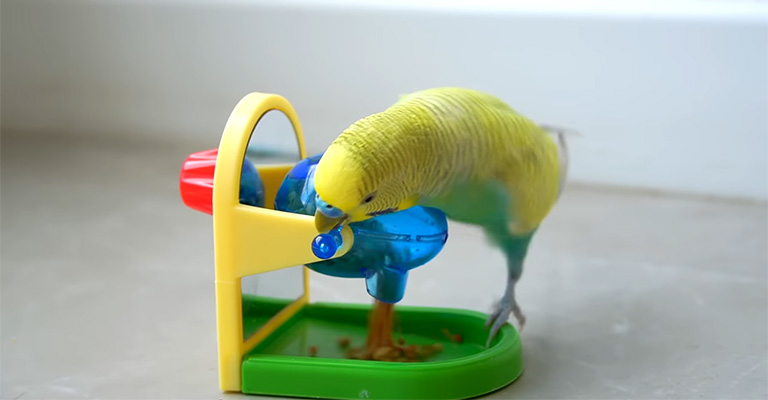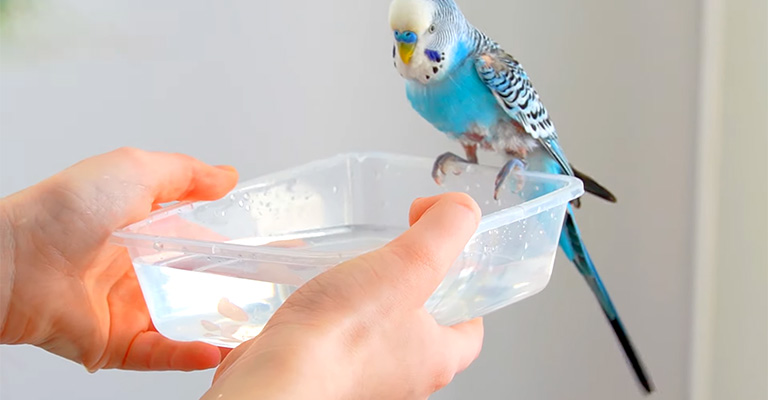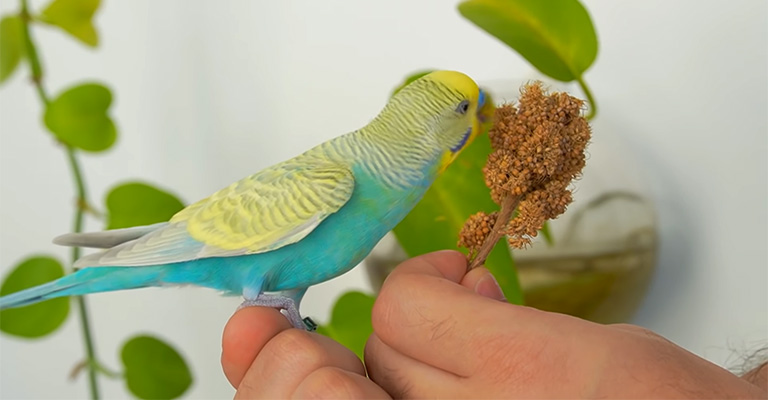Creating a comfortable and inviting environment for a pet bird is a multifaceted endeavour that combines the art of understanding avian behaviour and meeting their unique needs.
Birds, with their captivating plumage and vibrant personalities, bring a touch of the wild into our homes.
As we embark on the journey of making a bird feel at home, we delve into the intricacies of their natural instincts and behaviours. Beyond just providing a cage, food, and water, the process involves mimicking their native habitat and fostering a sense of security.
By learning what do you need to do to make a bird feel at home, we can create a haven that mirrors their natural habitats and allows them to flourish in our care.

What Do You Need To Do To Make A Bird Feel At Home?
Making a bird feel at home is a great way to ensure its happiness and well-being. Here are some effective tips on how to do that:
Provide A Spacious And Comfortable Cage
The cage should be large enough for the bird to spread its wings and move around freely.
It should also have a perch, a water dish, a food dish, and some toys for enrichment. The cage should be placed in a room with frequent traffic, but not too close to windows, drafts, or direct sunlight.
Clean The Cage Regularly
The cage should be cleaned at least once a week, and the water and food dishes should be cleaned daily.
Use a mild vinegar solution to scrub the cage and rinse it well with water. Avoid using synthetic soaps or cleansers, as they can harm the bird’s health.
Offer Fresh Food And Water Daily
Birds need a balanced diet that includes seeds, pellets, fruits, vegetables, and occasional treats. Provide fresh water every day, and change the food every few hours to prevent spoilage.
Avoid giving your bird chocolate, avocado, onion, garlic, alcohol, or caffeine, as these can be toxic.
Give Your Bird Access To Sunlight And Darkness
Birds need exposure to natural sunlight to produce vitamin D and regulate their circadian rhythms.
They also need 10-12 hours of darkness every night to rest and sleep. You can use a blackout cover to create a dark environment for your bird at night.
Let Your Bird Out Of The Cage For Exercise

Birds need physical activity to stay healthy and happy. Let your bird out of the cage for at least an hour a day, and supervise it closely.
Make sure the room is safe and bird-proofed, and remove any potential hazards or predators. You can also provide some perches, swings, or ladders for your bird to explore.
Provide Your Bird With Baths Or Showers
Birds love water and enjoy bathing or showering regularly. This helps them keep their feathers clean and healthy.
You can offer your bird a shallow dish of water, a spray bottle, or a faucet for bathing or showering. Make sure the water is lukewarm and not too hot or cold.
Interact With Your Bird Frequently
Birds are social animals and need human companionship to thrive. Talk to your bird, sing to it, play with it, and teach it some tricks or words.
Be gentle and patient with your bird, and avoid scaring or stressing it out. Reward your bird with praise or treats for good behaviour.
Provide Your Bird With A Birdbath Or Fountain
Birds are attracted by moving water and like to drink from it or splash in it. A birdbath or fountain can provide your bird with hydration and entertainment.
You can place it near the cage or outside in the garden. Make sure the water is clean and fresh, and change it every other day.
Support Bird Conservation Efforts
Birds are facing many threats in the wild, such as habitat loss, climate change, pesticides, predators, and diseases.
You can help protect birds by donating money, volunteering time, or spreading awareness about bird conservation issues. You can also join a local or national bird club or organization to learn more about birds and meet other bird lovers.
What Things Not To Do With Your Bird?

Caring for a pet bird requires understanding its unique needs and behaviours. To ensure the well-being of your feathered friend, here are some important things you should avoid doing:
Neglecting Social Interaction
Birds are social creatures. Avoid prolonged isolation, as it can lead to stress and behavioural problems.
Regular interaction, such as talking, playing, and spending time together, is crucial for their mental health.
Exposing to Harmful Fumes
Birds have sensitive respiratory systems. Avoid exposing them to tobacco smoke, scented candles, and strong fumes from cleaning products. These can lead to respiratory distress and other health issues.
Feeding Inadequate Diet
Providing a balanced diet is essential. Avoid feeding birds only seeds, as they lack essential nutrients. Instead, offer a variety of fresh fruits, vegetables, high-quality pellets, and occasional treats specific to your bird’s species.
Ignoring Regular Vet Visits
Birds can mask illness well, so regular check-ups are vital. Avoid neglecting routine vet visits. A qualified avian veterinarian can catch potential health problems early and provide proper care.
Keeping in a Small Cage
Birds need space to move and stretch their wings. Avoid confining them to a small cage.
Opt for a spacious and appropriately sized cage that allows room for natural behaviours like flying and perching.
Using Unsafe Toys and Accessories
Some toys or accessories can pose hazards. Avoid using items with small parts, sharp edges, or toxic materials that your bird might ingest or get tangled in.
Exposing to Drafts and Temperature Extremes
Birds are sensitive to temperature changes. Avoid placing their cage near drafts, air conditioning vents, or direct sunlight. Sudden temperature shifts can stress and harm them.
Lack of Mental Stimulation
Birds are intelligent and require mental stimulation. Avoid boredom by providing toys, puzzles, and opportunities for mental engagement. Enriching their environment prevents boredom-related behaviors.
Forcing Interaction or Handling
Respect your bird’s boundaries. Avoid forcing interaction or handling, especially if your bird appears stressed or uncomfortable. Gradually build trust and let them initiate contact.
By avoiding these common pitfalls and prioritizing your bird’s physical and emotional well-being, you’ll create a nurturing environment that allows your feathered companion to thrive.
Always research and understand the specific needs of your bird’s species to provide the best care possible.
How Do Birds Like To Be Touched?

Different birds may have different preferences for how they like to be touched, but in general, there are some common ways that birds enjoy being petted by their owners or trusted humans.
Here are some of them:
Head And Neck
Many birds like to have their head and neck gently scratched or rubbed, especially around the ears, cheeks, and chin.
This mimics the preening behaviour that birds do to each other in the wild and can help them bond with their human companions.
Chest And Belly
Some birds also like to have their chest and belly rubbed or tickled, especially if they are very tame and comfortable with you.
This can show trust and affection, as well as stimulate their natural grooming instincts.
Back And Wings
Some birds may also enjoy having their back and wings petted, especially if they are moulting or shedding feathers. This can help them relieve any itchiness or discomfort, as well as encourage new feather growth.
Beak
Some birds may also like to have their beak rubbed or tapped, especially if they are playful or curious. This can help them explore different textures and sensations, as well as exercise their beak muscles.
Feet
Some birds may also like to have their feet massaged or squeezed, especially if they are perching for long periods of time.
This can help them relax their muscles and joints, as well as improve their blood circulation.
FAQ
To make your bird comfortable, provide a spacious cage with perches and toys that encourage natural behaviours.
Mimic their wild environment by offering a variety of fresh foods, clean water, and suitable nesting materials.
Yes, birds are social creatures. Regular interaction, including talking and spending time with them outside the cage, helps prevent loneliness and boredom.
Birds need mental challenges to stay engaged. Offer toys that encourage problem-solving, such as puzzles and foraging toys, to keep their minds active and prevent boredom.
The cage is their sanctuary. Ensure it’s spacious, well-ventilated, and equipped with perches of varying thicknesses. Place it in a quiet, draft-free area away from direct sunlight and household hazards.
While you can’t replicate the wild exactly, provide features like branches, swings, and hiding spots to imitate their natural surroundings. Also, create a consistent routine, which adds a sense of security to their environment.
Conclusion
In the delicate interplay between nature and nurture, making a bird feel at home demands a thoughtful and holistic approach.
By replicating elements of their natural habitat offering opportunities for social interaction, mental engagement, and physical exercise, we lay the foundation for a harmonious coexistence.
The journey to ensuring a bird’s comfort is an ongoing one, adapting to their evolving needs and preferences.
s we strive to provide them with not just a shelter but a genuine home, we open the door to a world where the vibrant melodies and dynamic personalities of our feathered companions enrich our lives while finding solace in the haven we create for them.